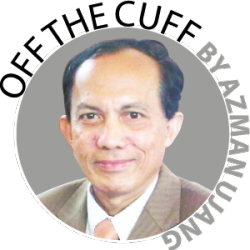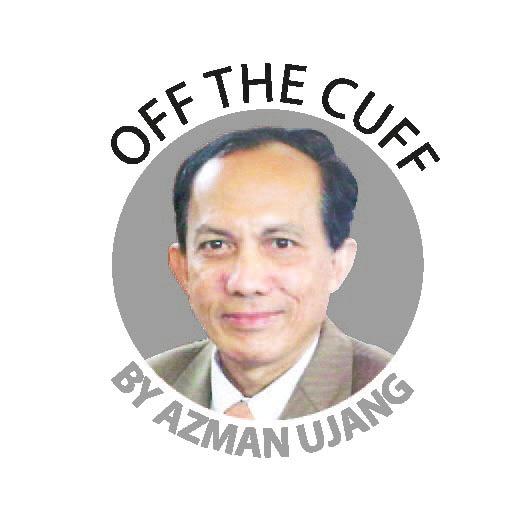I CAN’T think of a better example than Singapore’s success in fighting corruption. There’s much that we can learn especially in plugging weak links that seem to breed corruption to a such staggering level in Malaysia.
We are far from seeing light at the end of the tunnel after 40 years of institutionalised war against graft. Yes, it’s been a long war to break corruption’s backbone.
It boils down to the ease with which our checks and balances could be abused and manipulated and hardly a day passes without news reports on such abuse of power that results in corrupt practice.
The root cause of big-time corruption is too much money being moved around via high-cost projects and procurements and when integrity, the one vital “commodity” becomes a rarity or is thrown out by those entrusted with public funds.
While the temptation to commit corruption is far greater when huge sums of money are involved, this second oldest profession as it’s called, is also festering unabated even when petty amounts are involved.
Datuk Seri Akhbar Satar, a prominent anti-corruption activist, recently cited in his column an interesting story about the zero tolerance that former Singapore prime minister, the late Lee Kuan Yew had for corruption.
In 1961, Lee reportedly refused a bribe of US$3.3 million (equivalent to US$25 million or RM103 million at current value) from an agent of the Central Intelligence Agency (CIA) to keep an espionage attempt under wraps.
The agent had been caught trying to buy information from a Singapore intelligence officer.
Lee had said: “I had two options, either I get corrupted and I put my family in the Forbes’ list of the richest people in the world and leave my people with nothing or I serve my country, my people and let my country be in the list of the best 10 economies in the world. I chose the second”.
Transparency International (TI) last year ranked the island republic the third least corrupt country in the world with Denmark in top spot. A year earlier, Singapore and Finland were tied in third place.
Akhbar, a former president of TI Malaysia, told me: “We should take a train down South to learn to clean up our nation. No need to go far and wasting a lot of money and time. Put aside our egoistic behaviour and learn from Singapore.
“I know of a former IGP who sent a team to New York to study the anti-corruption programme. They could have saved a lot of money if they flew down South. To be more effective in fighting corruption, Malaysia being the closest to Singapore and with easy accessibility, may want to look at strategies implemented by the Singapore government to curb graft.”
In one of his visits to Malaysia after he stepped down as PM , I once asked Lee if there was anything in his zero tolerance against corruption that on hindsight he would have done differently.
He paused before responding as if not expecting it from me: But what he said was classic and is still etched in my mind although more than 20 years have passed by.
Lee said he once called in a Cabinet minister and told him that an allegation had been made against him for taking a bribe in connection with housing project deals.
“I told him that if the allegations are proven true, I won’t protect him and that he would have to face the full brunt of the law.”
But what happened next shocked Singapore and beyond.
Public perception was that the risks of being publicly exposed and facing Lee’s wrath were too much for him to bear and the minister committed suicide.
Lee told me: “To answer your question, yes, looking back, I would have handled the matter differently”.
Singapore’s public service continues to be recognised as one of the most efficient and cleanest in the world with only eight public sector employees prosecuted for graft and related offences over the past three years.
In an interview for Bernama that I had with Singapore Prime Minister Lee Hsien Loong at his office three years ago, I asked him how Singapore managed to consistently remain one of the world’s least corrupt nations.
“We try very hard. It is not easy, but it is necessary to continue making the effort. It helps that we started on the right footing, right from the beginning when the PAP took over in 1959, this was the prime consideration. We wanted to run a clean system, a clean civil service and a clean political leadership,” said Kuan Yew’s son.
Singapore has been unsparing in enforcing its anti-corruption laws and whoever transgresses it, whether senior or not, a civil servant or a minister will be investigated and consequences will have to follow.
“The public attitude is very important. Because without that, if the public accepts that it is a normal way to do business, that if you are in power then these are perks of the office, that will be a very different situation even if we have the laws,” he said.
Three days ago, the government tabled a bill in Parliament in another effort to strengthen the fight against financial crime which more often than not, entails corruption as well.
The National Anti-Financial Crime Centre will act as an integrated agency to ensure coordination of all enforcement agencies.
Everyone is looking forward to its effectiveness in the fight against corruption just like in Singapore.
Comments: letters@thesundaily.com















